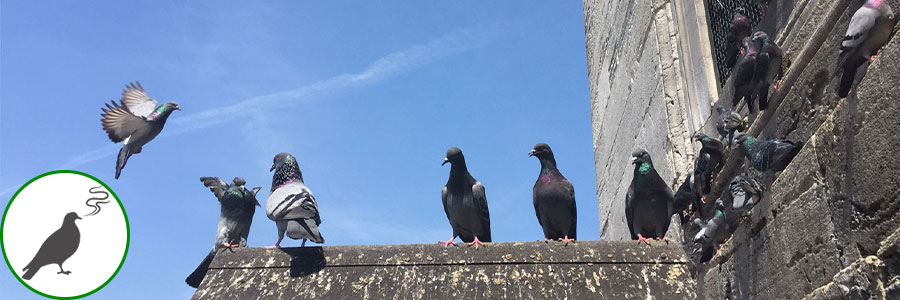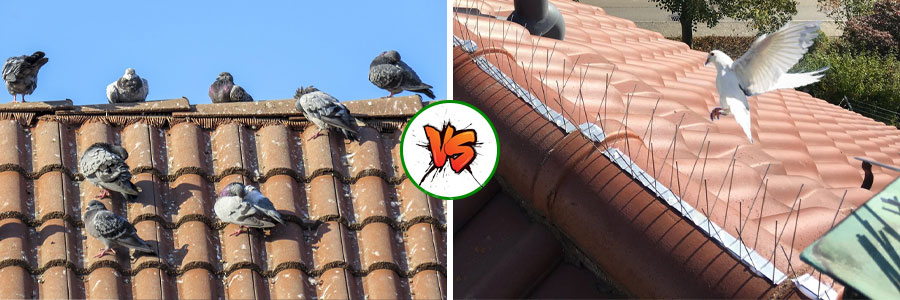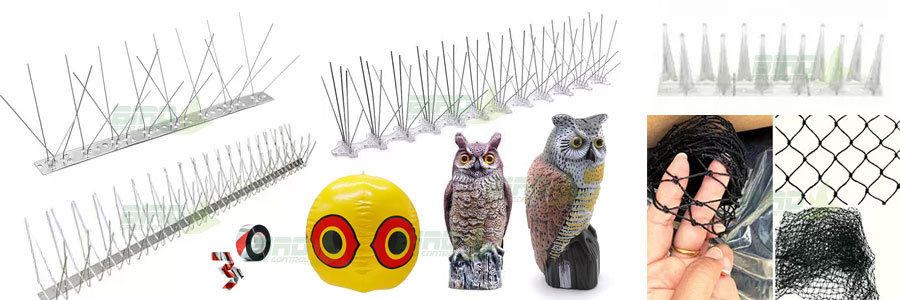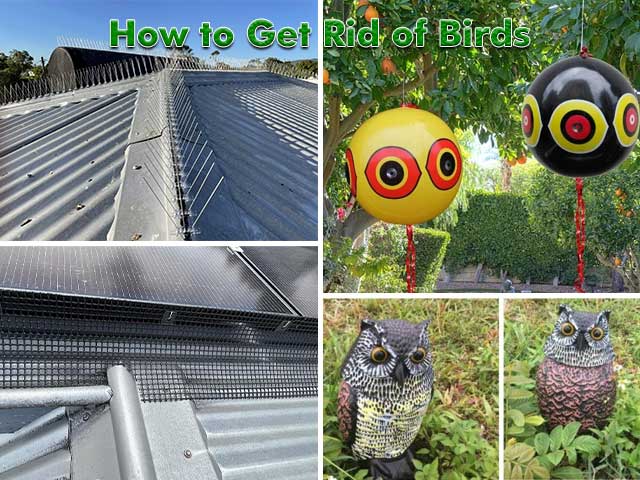
While watching or listening to birds is a pleasant experience, they can damage your property by nesting or leaving droppings in your garden, porch, roof, or gutters. So how do you keep birds away? Next, we will explore the secrets of home DIY and proven bird deterrents in this article. Learn more about smells to repel birds, and hope it will help your bird deterrent at home.
What Smell Will Keep Birds Away?
Can birds smell? The answer is yes. Scientific research has found that pigeons experience an increased heart rate when they detect certain specific odors. Seabirds can smell the odors released by phytoplankton, the primary food source of krill. List some common natural bird repellents:
Citrus Scents: While citrus scents are pleasant to humans, some birds, such as pigeons, swallows, sparrows, and crows, dislike them. Using citrus sprays or placing citrus peels can help you repel birds, but the scent must come into direct contact with the birds to be effective.
Lemon: Lemon is one of the natural bird deterrent solutions that is non-toxic and harmless to birds. The strong scent of lemon can keep birds away. Place fresh lemon peels in areas where birds might frequent, such as gardens, balconies, or window sills, or use lemon essential oil to keep birds at bay.
Garlic and Onions: The strong, pungent smell of garlic and onions can also repel birds. Cut garlic and onions and place them in areas where birds often appear or nest, such as gutters and under roofs, or make a garlic-onion spray to achieve significant results.
Chili Peppers: The spicy smell of capsaicin in chili peppers is disliked by birds. You can mix chili powder with water and place or spray it around areas you want to keep birds away from. Even if you spray chili solutions on plants, it will not harm your plants or property.
Vinegar: The pungent and unpleasant smell of vinegar can irritate birds and keep them away. However, vinegar can harm your plants, so it is best to spray it on porches, garages, and other areas away from fruits and vegetables.
Cinnamon: Cinnamon is an effective and affordable method commonly used in cooking. You can sprinkle some cinnamon powder or place some cinnamon sticks in your garden or patio. The strong aroma of cinnamon can keep birds away from your property.
Mint: The refreshing scent of mint has a strong repelling effect on birds, making them feel very uneasy. Mint oil or mint plants can effectively deter birds.
Mothballs: The pungent smell of mothballs is unbearable for birds. You can place mothballs in areas where birds frequently roost or nest. However, the scent of mothballs dissipates quickly, so it’s best to check and replace them regularly.
Citronella: The lemony scent of citronella oil is very unpleasant for birds. You can spread fresh citronella grass or citronella oil in your garden. Not only will it deter birds, but it can also effectively repel mosquitoes and flies, killing two birds with one stone.
It is well known that while the specific smells that attract birds vary by species, birds are particularly fond of their droppings or nesting traces. Therefore, when using these natural bird deterrents, make sure to clean up bird droppings and nesting traces to effectively repel birds.

How to Make Bird Repellent Spray?
Making your own bird repellent spray is a cost-effective and humane way to keep birds away from your garden, porch, or any other area they frequent. The methods for making natural bird repellents are similar, so here are a few methods:
Making Citrus Bird Repellent Spray
- Ratio: about 2-3 lemons or other citrus, 1 liter of water.
- Cut the lemons or other citrus into segments or slices.
- Boil water and add the citrus, simmer for about 40 minutes.
- Let the mixture cool completely, filter the liquid (remove the pulp or seeds).
- Pour the filtered liquid into a spray bottle and spray the citrus bird repellent around the area you want to get rid of birds.
Peppermint and Citronella Spray
- Ratio: 500 ml water, 10 drops of peppermint oil, 10 citronella oil.
- Mix 500 ml of water with 10 drops of peppermint and 10 drops of citronella oil.
- Stir well and pour the mixture into a spray bottle.
- Spray the solution on the garden, patio or other areas where birds are present.
Garlic and Chili Spray
- Ratio: 1 L water, 3 cloves garlic, 2 tablespoons crushed red pepper flakes or chili powder.
- Add the chopped garlic and red pepper flakes or chili powder to boiling water.
- Simmer for about 20 minutes, let cool completely, and strain the mixture (remove the garlic and chili flakes).
- Fill a spray bottle with the liquid and spray it on the garden, plants or any other area that is a nuisance to birds.
Are Homemade Birds Repellents Effective?
Proven through practical use, these homemade bird repellents are effective against birds, rodents, and insects, such as pigeons, swallows, mice, and mosquitoes. The scents spread through the air, preventing pests from entering the area covered by the smell. These homemade repellents are natural, non-toxic, and safe for deterring birds. However, the scent does not last long, so it is necessary to regularly reapply the spray in areas where birds frequently perch or nest.

What is the Proven Most Effective Bird Deterrent?
Although these natural bird deterrents can prevent birds from entering certain areas around your home, they may be less effective in the long run. Next, let’s see Hebei Crown Wealth how professional bird control experts humanely deter birds:
Bird Spikes

Hebei Crown Wealth offers various types of bird spikes, including stainless steel bird spikes, PC base stainless steel bird spikes, gutter bird spikes, plastic bird spikes, and solar panel bird spikes. Bird spikes are a long-lasting physical barrier used to prevent birds from perching on surfaces. They are installed on ledges, roofs, gutters, solar panels, and other areas where birds frequently roost or nest.
Bird Netting
Our bird netting is made of UV-resistant HDPE material, used to cover areas such as gardens, balconies, and building facades to prevent birds from entering these spaces. It effectively protects crops and buildings from bird damage.
Visual Bird Deterrents
Visual bird deterrents include objects like bird deterrent scare tape, predator decoys (such as owl decoys), and scare balloons. They scare birds away through visual stimuli, exploiting birds’ natural fear of predators or sudden movements.
Sonic and Ultrasonic Bird Deterrents
Sonic bird deterrents and ultrasonic bird deterrents are common devices that use sound to deter birds. Sonic bird deterrents utilize predator sounds, such as the calls of hawks or foxes, to scare birds away. Ultrasonic bird deterrents, on the other hand, emit high-frequency sounds that birds can hear, which irritate them and drive them away. The sounds emitted by both sonic and ultrasonic bird deterrents are considered noise pollution in some areas and are therefore legally prohibited. Another possibility is that birds may become accustomed to these sounds and realize there is no actual danger, rendering the bird deterrent devices ineffective.

Conclusion
So how do you choose DIY vs. proven bird deterrents? Based on the smells birds dislike, homemade bird repellents can be used on a small scale at home, but their effectiveness is hard to guarantee, often requiring frequent reapplication of the bird spray. For larger-scale or long-term bird control issues, consider using aesthetically pleasing and humane bird deterrent devices solutions such as bird spikes, visual bird deterrents, bird netting, bird deterrent spinner, and bird deterrent reflectors provided by Hebei Crown Wealth to deter birds from roosting on nesting around your home. Feel free to contact us if you have any questions about bird control.
FAQ
What are Bird Spikes?
Bird spikes, also known as bird control spikes or pigeon spikes, are devices made up of long needle-like rods used to control birds. Our company bird spikes using high-grade materials such as 201/304/316 stainless steel or UV-resistant polypropylene. These bird spikes can be installed on bird deterrents for windows, roofs, gardens, boats, buildings, lampposts, and commercial signage to humanely prevent birds from roosting or nesting and it won’t hurt the birds.
Where Should You Use Bird Spikes?
Since bird spikes are available in a variety of widths and sizes, they can be adapted to almost any surface. You can purchase bird spikes in different shapes and widths to fit different surfaces on your building. Bird spikes are best suited for:
– Window Sills
– Signs
– Rooflines
– Parapet Walls
– Eaves
– Ledges
– I-beams
– Overhangs
– Pipes
– Chimneys
Why Bird Control?
- Property Protection: Birds can cause damage to buildings, vehicles, and infrastructure through nesting activities, droppings, and pecking.
- Health: Health concerns arise from bird droppings, which may harbor diseases and pathogens, potentially endangering human health.
- Safety: Birds nesting near airports can pose a serious threat to aircraft safety, leading to potential accidents.
- Aesthetic and Hygiene: Bird droppings can deface buildings and outdoor spaces, impacting their visual appeal and cleanliness.
- Crop Protection: Birds can damage crops and fruit orchards, leading to significant economic losses for farmers.
Bird Spikes Installation Cost
Several factors contribute to the cost of installing bird spikes, including the choice of materials, the size of the installation area, Installation method (steel strapping, nylon tie, glue adhesive, and screw fixing), and labor expenses influenced by the accessibility of the installation site. For an exact estimate, please contact one of our dedicated sales managers who can provide a tailor-made quote based on your specific requirements and site conditions.



